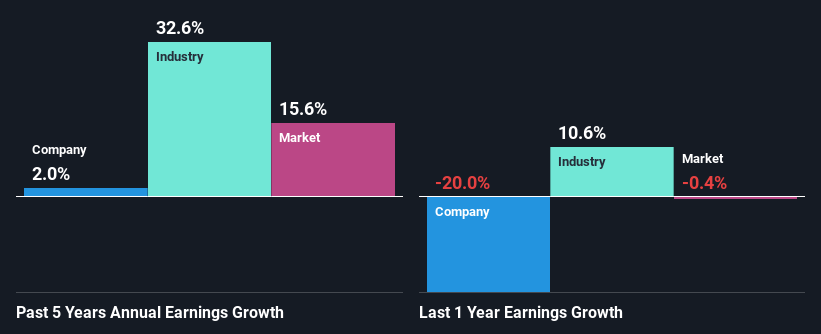Should Weakness in Beach Energy Limited's (ASX:BPT) Stock Be Seen As A Sign That Market Will Correct The Share Price Given Decent Financials?
It is hard to get excited after looking at Beach Energy's (ASX:BPT) recent performance, when its stock has declined 5.7% over the past three months. However, stock prices are usually driven by a company’s financials over the long term, which in this case look pretty respectable. In this article, we decided to focus on Beach Energy's ROE.
ROE or return on equity is a useful tool to assess how effectively a company can generate returns on the investment it received from its shareholders. In short, ROE shows the profit each dollar generates with respect to its shareholder investments.
View our latest analysis for Beach Energy
How Do You Calculate Return On Equity?
The formula for return on equity is:
Return on Equity = Net Profit (from continuing operations) ÷ Shareholders' Equity
So, based on the above formula, the ROE for Beach Energy is:
10% = AU$401m ÷ AU$3.9b (Based on the trailing twelve months to June 2023).
The 'return' is the profit over the last twelve months. That means that for every A$1 worth of shareholders' equity, the company generated A$0.10 in profit.
Why Is ROE Important For Earnings Growth?
We have already established that ROE serves as an efficient profit-generating gauge for a company's future earnings. Depending on how much of these profits the company reinvests or "retains", and how effectively it does so, we are then able to assess a company’s earnings growth potential. Assuming all else is equal, companies that have both a higher return on equity and higher profit retention are usually the ones that have a higher growth rate when compared to companies that don't have the same features.
Beach Energy's Earnings Growth And 10% ROE
At first glance, Beach Energy seems to have a decent ROE. Even so, when compared with the average industry ROE of 18%, we aren't very excited. Additionally, the flat earnings seen by Beach Energy over the past five years doesn't paint a very bright picture. Not to forget, the company does have a decent ROE to begin with, just that it is lower than the industry average. So there might be other reasons for the flat earnings growth. Such as, the company pays out a huge portion of its earnings as dividends, or is faced with competitve pressures.
As a next step, we compared Beach Energy's net income growth with the industry and were disappointed to see that the company's growth is lower than the industry average growth of 33% in the same period.
Earnings growth is an important metric to consider when valuing a stock. It’s important for an investor to know whether the market has priced in the company's expected earnings growth (or decline). Doing so will help them establish if the stock's future looks promising or ominous. Is Beach Energy fairly valued compared to other companies? These 3 valuation measures might help you decide.
Is Beach Energy Making Efficient Use Of Its Profits?
Beach Energy's low three-year median payout ratio of 13% (implying that the company keeps87% of its income) should mean that the company is retaining most of its earnings to fuel its growth and this should be reflected in its growth number, but that's not the case.
Additionally, Beach Energy has paid dividends over a period of at least ten years, which means that the company's management is determined to pay dividends even if it means little to no earnings growth. Upon studying the latest analysts' consensus data, we found that the company's future payout ratio is expected to rise to 38% over the next three years. Still, forecasts suggest that Beach Energy's future ROE will rise to 13% even though the the company's payout ratio is expected to rise. We presume that there could some other characteristics of the business that could be driving the anticipated growth in the company's ROE.
Conclusion
Overall, we feel that Beach Energy certainly does have some positive factors to consider. However, while the company does have a decent ROE and a high profit retention, its earnings growth number is quite disappointing. This suggests that there might be some external threat to the business, that's hampering growth. Having said that, looking at the current analyst estimates, we found that the company's earnings are expected to gain momentum. To know more about the latest analysts predictions for the company, check out this visualization of analyst forecasts for the company.
Have feedback on this article? Concerned about the content? Get in touch with us directly. Alternatively, email editorial-team (at) simplywallst.com.
This article by Simply Wall St is general in nature. We provide commentary based on historical data and analyst forecasts only using an unbiased methodology and our articles are not intended to be financial advice. It does not constitute a recommendation to buy or sell any stock, and does not take account of your objectives, or your financial situation. We aim to bring you long-term focused analysis driven by fundamental data. Note that our analysis may not factor in the latest price-sensitive company announcements or qualitative material. Simply Wall St has no position in any stocks mentioned.

 Yahoo Finance
Yahoo Finance 
